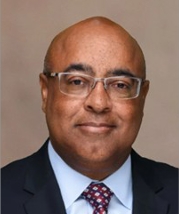Humanitarian Aid in Action: A Global Commitment to Health
Article information

At Direct Relief, we operate on a simple but powerful belief: health is a human right, and humanitarian aid is an essential tool to make that right a reality for the world’s most vulnerable people. Headquartered in Santa Barbara, California, Direct Relief was founded by a refugee who fled the horrors of World War II in Eastern Europe. From those humble beginnings, we’ve grown into one of the largest humanitarian aid organizations in the United States—and, in terms of air-freighted humanitarian supplies, one of the largest in the world.
The Intersection of Health and Peace
You can’t have health without global peace. It’s something we see every day. War, displacement, poverty—these are not just political or economic crises; they are health emergencies. At Direct Relief, we’re focused on addressing the root causes that impact people’s well-being. The social determinants of health—things like where you live, your education level, your access to clean water or nutritious food—are just as important as medicine or doctors. These are the conditions that define people’s chances of living a healthy life, and they’re often taken for granted in more developed nations.
The Power of Cold Chain: Delivering Hope
A key area where we’ve been able to make a significant impact is through cold-chain logistics—transporting temperature-sensitive medical supplies such as vaccines, insulin, and oncology drugs. These products save lives, but they require incredibly precise handling. We’ve built systems that allow us to move these vital medicines across continents without compromising their efficacy. And we do it for the people who need it most.
For example, through our Life for a Child initiative, we now provide insulin to over 50,000 children in nearly 50 countries around the world. It’s not just about getting the insulin. It's about making it sustainable—working in partnership with pharmaceutical companies who donate the insulin, and logistics partners who help us ship it where it needs to go. That’s the power of collaboration.
Advancing Care for Cancer and Rare Diseases
In pediatric cancer, we’ve made strides by building partnerships with some of the largest pharmaceutical companies in the world. We’re working in five African countries, supported by a major children’s hospital in Texas, to deliver pediatric oncology drugs and provide training for local providers. It’s not just about delivering medicine; it’s about building systems of care that last.
We’re also stepping up our support for children suffering from rare diseases—conditions that often require extremely expensive, highly specialized drugs. Again, these are children who live in parts of the world where those treatments would otherwise be out of reach.
Supporting the Most Vulnerable
The work we do is guided by one core principle: serve the most vulnerable. That includes children, pregnant women, the elderly, and people living in crisis zones. Over the last decade, we’ve developed specific humanitarian kits that target high-need populations. For example, we’ve distributed over 5,000 midwife kits, supporting more than 225,000 safe births in some of the most remote areas of the globe. That’s the power of generosity—combined with listening, learning, and responding to real needs on the ground.
Transparency and Trust
At Direct Relief, transparency isn’t just a value—it’s a practice. We take pride in being accountable and responsible with every dollar donated. In fact, over 50% of our funding comes from individual donors—people who believe in what we do and want to be part of the solution. The remaining support comes from foundations and corporate partners, many of whom donate not just money but also products and services that amplify our impact.
A Global Effort, One Human at a Time
Our work is possible because people care—because they act. Whether it’s a corporation offering vital medications, a foundation funding a new project, or an individual sending what they can, the story of Direct Relief is a story of collective human effort.
We don’t pretend to have all the answers. But we do have a deep commitment to listening, responding, and showing up where we’re needed most. Humanitarian aid in action means being present, being prepared, and being persistent. Because every person deserves access to health—regardless of where they live or what they’ve been through.
In service and solidarity,
Acknowledgments
As part of the GEEF for All 2025 series hosted by Yonsei University in Seoul, South Korea, Dr. Byron Scott delivered a powerful lecture on the role of humanitarian aid in advancing global health equity. Drawing on his leadership at Direct Relief, Dr. Scott emphasized the critical links between health, peace, and the social conditions that shape human well-being. This article is adapted from his presentation.
Byron Scott, MD, MBA, is President and Chief Operating Officer of Direct Relief, one of the world’s leading humanitarian medical organizations. A board-certified emergency physician and nationally respected healthcare executive, Dr. Scott brings decades of experience in clinical care, health system leadership, and quality improvement. He previously served as Deputy Chief Health Officer at IBM Watson Health, Associate Chief Medical Officer at Truven Health Analytics, and Executive Vice President at EmCare. He is board certified in Emergency Medicine and Healthcare Quality Management, a Certified Physician Executive, and a Fellow of the American College of Emergency Physicians. In addition to his executive leadership, he teaches healthcare quality and patient safety at Thomas Jefferson University and healthcare performance improvement at the University of Massachusetts Amherst. He serves on the boards of Accuray, Providence Health Plan, and Rady Children’s Hospital–San Diego, and holds cybersecurity and board governance certifications from the National Association of Corporate Directors (NACD).
** As part of the GEEF for ALL 2025 series hosted by Yonsei University in Seoul, South Korea, Dr. Byron Scott delivered a powerful lecture on the role of humanitarian aid in advancing global health equity. Drawing on his work with Direct Relief, Dr. Scott emphasized the critical links between health, peace, and the social conditions that shape human well-being. This article is adapted from his presentation.